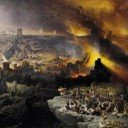The next section in Chapter revolves around the introduction of three angels and the announcements they bring with them. We will deal with the first two announcements in this post and reserve discussion on the third proclamation for the next post.
Rev 14:6 Then I saw another angel flying directly overhead, with an eternal gospel to proclaim to those who dwell on earth, to every nation and tribe and language and people. 7And he said with a loud voice, “Fear God and give him glory, because the hour of his judgment has come, and worship him who made heaven and earth, the sea and the springs of water.”
With the declaration of this first angel we see the proclamation of the Gospel throughout the whole world. This is very familiar language to those who have read our discussion of the Olivet Discourse. Jesus used similar language to describe the impact of the Gospel at the time near the fall of the city of Jerusalem and the destruction of the Temple.
Matt 24:29 “Immediately after the tribulation of those days the sun will be darkened, and the moon will not give its light, and the stars will fall from heaven, and the powers of the heavens will be shaken. 30Then will appear in heaven the sign of the Son of Man, and then all the tribes of the earth will mourn, and they will see the Son of Man coming on the clouds of heaven with power and great glory. 31And he will send out his angels with a loud trumpet call, and they will gather his elect from the four winds, from one end of heaven to the other.
As we saw in our discussion of the Olivet Discourse this relates to a time of great Gospel success after the fall of Jerusalem. We know historically this came to be as with the end of the Old Testament center for worship - The Temple - the Gospel of Christ was proclaimed and those that were predestined to be His came to Him through the proclamation of the Gospel.
Note in the passage under consideration that the proclamation of this everlasting Gospel is tied directly to the time of God’s judgment. This, like Jesus’ words in the Olivet Discourse tie the success of the Gospel to the destruction of the city and the wrath of God poured out on the first persecutor of the Church.
We then see how this time of wrath is responded to in Heaven with the proclamation of the second angel.
Rev 14:8 Another angel, a second, followed, saying, “Fallen, fallen is Babylon the great, she who made all nations drink the wine of the passion of her sexual immorality.”
This declaration is made at the same point that the Gospel is proclaimed throughout the world and ties directly to the time of the destruction of the city of Jerusalem and so this proclamation should be best seen as being related to the destruction of Jerusalem and not Rome. Though there may be seen by many a shift in the emphasis of the object of God’s wrath, it is clear He is not finished declaring His wrath against Jerusalem.
No other name leveled against the city (including Sodom and Egypt) can be as curse filled as to call Jerusalem by the name of her greatest enemy, Babylon. This ultimate insult seals the feeling Good has toward her at this point in history. She has killed His son, their Messiah and has done so by whoring herself with the evil, pagan nation of Rome.
As mentioned previously, no other nation can be seen as sexually immoral from a Covenantal point of view than the nation of Israel. She continues her Old Testament description of playing the Harlot and spread her sexual immorality amongst the other nations by joining forces with them to persecute the Church Jesus had built.
This description includes how historically she has “made the nations drink the wine of her passion.” This points to Israel’s long standing history of rejecting the statues of God and going after other nation’s gods and worshiping their idols. She, through her embracing of false gods, shows her immorality.
Since a better word for “passion” in this passage would actually be “wrath” we see here this is referencing how the immoral actions of Israel will cause the other nations to “taste” the wrath of God. In other words, her enticing of the Rome to join with her in killing Jesus Christ will cause the wrath of God to be poured out on the other nations as well.This is something we will see in the following chapters.
This point cannot be missed. The covenantal binds described between Israel (the wife) and God Jehovah (the husband) are seen as marital binds. When Israel went after the idols of other nations she whored herself and broke covenant with the Lord God. The greatest proof of their harlotry would be found in the whoring herself with Rome to kill the Lord of Glory!
Babylon is fallen!





No comments:
Post a Comment